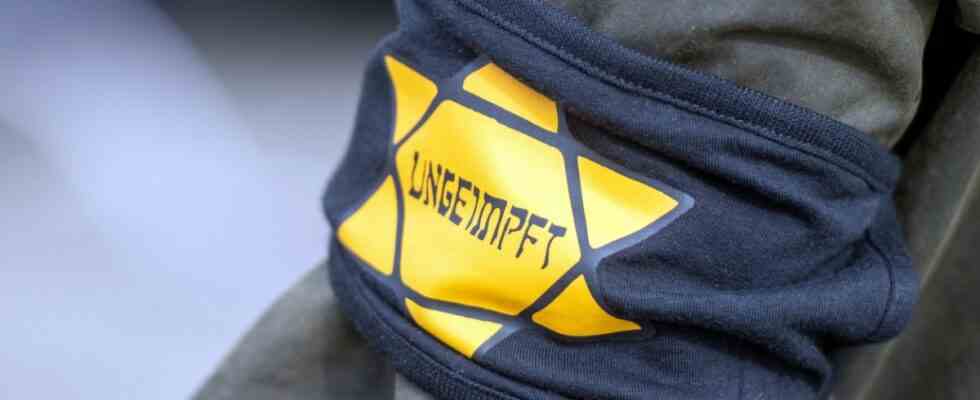A security guard publicly shows the Hitler salute to Israeli athletes who are on their way to memorial sites for the 1972 Olympics attack. At a rally on Munich’s Marienplatz, a speaker compared Israel to Nazi Germany and claimed to applause that “anyone who is pro-Israel today would have been pro-Third Reich in the last century.” In Tengstraße in Munich, a swastika is scratched into the memorial for Mina Bergmann, who was murdered in Theresienstadt, and the death march memorial on the Munich Blutenburg is desecrated.
More than half of all anti-Semitic incidents documented in Munich and the rest of the Free State of Bavaria are related to the Holocaust: According to the RIAS research and information center, so-called post-Shoah anti-Semitism is “the most pronounced manifestation of anti-Semitism in Bavaria”. According to Rias Bayern director Annette Seidel-Arpacı, these “attacks on memory” are “essential prerequisites for denying and living out anti-Semitism today.” On Wednesday she presented a brochurewhich documents and analyzes such incidents, but also provides a comprehensive overview of post-Shoah anti-Semitism in the Federal Republic and in Bavaria since 1945.
Rias Bayern has been documenting anti-Semitic incidents in Bavaria since 2019. In these three and a half years, three attacks, 35 targeted damage to property, 16 threats, 79 mass mailings and 437 cases of injurious behavior were classified as post-Shoah anti-Semitism. There were 183 public gatherings at which the Holocaust was relativized in speeches, chants or on posters. 120 cases could be assigned to the conspiracy ideological milieu and 107 cases to the right-wing extremist spectrum. 307 such incidents were known from Upper Bavaria.
Across Bavaria, 235 cases are related to the corona pandemic
Rias, the Research and Information Center for Antisemitism in Bavaria, documented a total of 249 anti-Jewish incidents in Munich in 2021 alone. Three of these were attacks, two targeted property damage, ten threats and twelve mass mailings. 22 of these incidents were also reported to the police.
According to Rias, 235 cases of post-Shoah anti-Semitism in Bavaria are related to the corona pandemic. These included one targeted damage to property, three threats, eight mass mailings, and 223 cases of abusive behavior. Miriam Heigl, head of the Munich City Department for Democracy, confirms this: “In the context of the corona pandemic, but also the Russian war of aggression, we are increasingly seeing a relativization of the Holocaust at meetings in Munich and an increasing rejection of memories of the Shoah.”
The word “Injection Holocaust” could be read on a poster at an anti-vaccination event in December, while another showed the entrance gate to the Theresienstadt concentration camp with the text “Vaccination sets you free”. In the foreword to the Rias brochure, Shoah survivor Abba Naor, Vice President of the Comité International de Dachau (CID), is shocked about “the current increase in anti-Jewish attitudes in German society, not least in the Corona protests at which breeding ground the old conspiracy myths thrive”.
Since the beginning of the pandemic, opponents of vaccination have repeatedly attacked the concentration camp memorial
The Rias brochure recalls that in 2019 the video blogger Nikolai Nerling, convicted of Holocaust denial, shot a video behind the Dachau memorial site against the supposed German “guilt cult” and said in it: “Go to memorial stones, go to camps and say that you doesn’t feel guilty. For a free Germany and against the cult of guilt.” Since the beginning of the pandemic, corona deniers and opponents of vaccination have repeatedly attacked the concentration camp memorial on the outskirts of Munich. According to Rias, a number of visitors compare the pandemic measures with Nazi crimes, equate themselves with persecuted Nazi victims and thus abuse the former concentration camp for their own ideology. There are also numerous examples of this in conspiracy ideological Munich telegram groups – including addresses in solidarity with the Holocaust denier Ursula Haverbeck, who has been convicted by law.
Public prosecutors and courts are now consistently taking action against anti-Jewish hate speech. In March, the Munich district court imposed a fine of 130 daily rates of 15 euros for incitement to hatred. The subject of the process was a photo montage with the inscription “Work/vaccination sets you free” and two oversized syringes that had been drawn. Last Friday, the anti-Semitism commissioner of the Bavarian judiciary, the Munich public prosecutor Andreas Franck, held the first workshop on anti-Semitic crimes in Bavaria and Austria. 20 experts from Bavaria and Austria as well as the EU Commission discussed the effective prosecution of anti-Jewish crimes in the offices of the Attorney General in Munich, Reinhard Röttle. The central topic was also Holocaust comparisons in Corona demonstrations.
The Bavarian judiciary and the Austrian security agencies have already worked together successfully on several occasions. In February, officers from the Traunstein public prosecutor’s office and the criminal police searched the home of a 59-year-old man from Rosenheim who was suspected of having repeatedly denied the Holocaust on social media channels and called for “hunting” on the government. This was based on a note from the State Office for the Protection of the Constitution and Combating Terrorism in Tyrol. The Munich public prosecutor’s office is investigating an Austrian who, in emails sent to addressees in Munich, demands that “racist Israelis” – meaning Jews – be banned from European politics, universities and the media, and who describes Zionists as “Nazis”.

